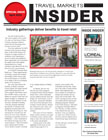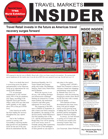 A year and a half after the merger of North Carolina’s Banks Channel and Miami’s WEBB, the newly created wine and spirits distributor has had a highly successful integration, even with the devastating hurricanes that struck parts of the Caribbean last summer.
A year and a half after the merger of North Carolina’s Banks Channel and Miami’s WEBB, the newly created wine and spirits distributor has had a highly successful integration, even with the devastating hurricanes that struck parts of the Caribbean last summer.
First half sales for 2018 are up 33 percent against the pre-hurricane numbers says WEBB Banks President Andy Consuegra, who tells TMI that his company is now seeing the benefits of the merger.
“We merged Banks and WEBB 18 months ago to create WEBB Banks, and we now have what we think is the strongest portfolio in the region. We focus on the Caribbean and Central America. The merger isn’t about one plus one equals two it has to be one plus one equals ten,” says Consuegra.
Partnerships with the in-market distributor are one element in the success of the merger, he explains.
“Today, as a result of that merger and of consolidating with the in-market distributors, we are the number one supplier to eight of them and number two to five more in wines and spirits. That is pretty substantial.
“We are really partnering with the in-market distributors, having portfolio managers there inside their operations, constant and frequent trips to market, brand trainings, giving them the tools, developing the marketing plans. That is the benefit.”
Consuegra says the power of the combined portfolios of WEBB and Banks has allowed WEBB Banks to compete with large multi-national wine and spirits companies.
“I think our portfolio is well-balanced today. We are about half wines and half spirits. So we can go into an account and be a one stop supplier. We have wines from entry level to luxury. We have six hundred wines that are rated 90 plus points,” he says.
“In spirits, we have really strong brands that complement each other. Obviously having a brand like Tito’s Vodka in our stable opens a lot of doors. Tito’s caters to basically every consumer group, from millennials to the baby boomers. And what more can be said about Macallan? It is the number one single malt in value and it still has a lot of growth potential. We picked up Jagermeister about nine months ago.”
WEBB Banks’ 2018 has been particularly impressive as the numbers are up against what was a very strong first half of the year last year in the Caribbean, before the hurricanes hit.
“After a disastrous end of 2017 because of the hurricanes, this year we are up 33 percent against the pre-hurricane numbers. We are going to go into H2 and we are up against a soft H2 from last year.
“What happened was a shift from brands that were sold mainly to tourists to brands that are for the local population and people working in those markets. We still think we are a good year to two years away from getting back to the normal, pre-hurricane business. The markets are holding steady, they are coming back. We are getting good orders. There are certain brands that are doing better than others. Brands that depended solely on the tourists are not doing too well in those hurricane-affected markets. However, brands like Nineteen Crimes (wine) and Brugal are doing really well.
“Up until August last year the Caribbean was on pace to break all records for tourist arrivals. And then everything halted. Tourism numbers ended the year about up two percent. This year we are seeing the number of tourists going into markets that were impacted by the hurricanes way down. Other markets, like the Bahamas, the Cayman Islands, and Jamaica, are up significantly. There has been a shift. The Dominican Republic is up nine percent, but that is off a big base. Some islands are way down and some are way up.”
Consuegra says the Caribbean hurricanes brought WEBB Banks and its distributor partners closer together.
“They say that adversity can really bring people closer together and I think that is what happened. It was personal for us. We raised more than $100,000 the first week just to help the employees. It has created more bonding and partnerships,” he says.
“I am still really proud of what the team did. We were right there manning the phones, working with the employees of the different distributors. When we lost power in Miami the North Carolina team kept going and was making sure that people were okay, and in some cases getting them off islands.”









